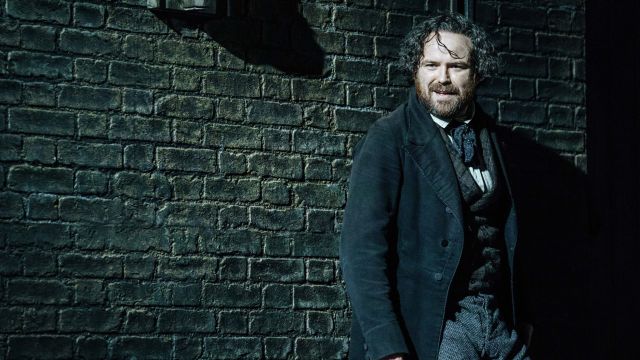Young Marx
Rory Kinnear plays the eponymous Marx brilliantly – albeit as a comic character. His Marx is self-absorbed, self-serving, selfish and shifty – a man who loves mankind in the abstract, but is quite prepared unthinkingly to ignore and exploit the people who love and support him. At the same time, he is preoccupied, constantly applying his forensic and analytical skills to the 19th century industrialised world’s political economy – and making some very prescient predictions about the future of Capitalism, predictions which have turned out to be all too accurate in our present – and are greeted with the rueful laughter of recognition from the audience.
In its way, Young Marx is timely since there is much heated current debate, especially exacerbated by theWeinstein allegations,about the gap between the creator and the work. Mostly the argument is about artists (although it’s these days about politicians too): should we reject the work if the creator was a scoundrel, exploiter, abuser, etc.? But why not ask the same question of philosophers too? Heidegger the Nazi, for instance? Young Marx relies on – revels in - that very question. ‘See – he was a genius,’ Engels says in the dialogue and the play says implicitly, ‘but he was also a bastard.’ Well, maybe a nice bastard? He has a thirst for Justice. He means well, anyway…
 Mr Kinnear plays to the paradox: his young Marx is constantly caught out and startled that he is, guilty when it’s too late, swift but unconvincing to excuse himself, needy, sentimental, prickly but with moments of insight that come like cloud breaks… but have little or no effect moments later. In all this, he is more than ably supported by Oliver Chris as Friedrich Engels in an elegant performance of vitality and authority – tall, handsome, a womaniser, but often the only grown-up realist around. Laura Elphinstone as Helene ‘Nym’ Demuth, nominally the family maid, but also Marx’s collaborator and sometime covert mistress, has a solidity and a touching presence that is moving amidst the pacey comedy. Nancy Carroll’s Jenny von Westphalen – Mrs Marx – is underwritten so that what we get is someone who somehow endures Marx and we’re only told she loves him. There is much doubling up from the rest of the cast and that occasionally gets confusing, but overall, the playing is pretty broad (especially Eben Figueiredo as Konrad Schramm – way over the top), as if the cast is too aware ‘we’re in a comedy’. I did wonder if vastly experienced director Nicholas Hytner intended all this – or was it in pursuit of a ‘broader audience’?
Mr Kinnear plays to the paradox: his young Marx is constantly caught out and startled that he is, guilty when it’s too late, swift but unconvincing to excuse himself, needy, sentimental, prickly but with moments of insight that come like cloud breaks… but have little or no effect moments later. In all this, he is more than ably supported by Oliver Chris as Friedrich Engels in an elegant performance of vitality and authority – tall, handsome, a womaniser, but often the only grown-up realist around. Laura Elphinstone as Helene ‘Nym’ Demuth, nominally the family maid, but also Marx’s collaborator and sometime covert mistress, has a solidity and a touching presence that is moving amidst the pacey comedy. Nancy Carroll’s Jenny von Westphalen – Mrs Marx – is underwritten so that what we get is someone who somehow endures Marx and we’re only told she loves him. There is much doubling up from the rest of the cast and that occasionally gets confusing, but overall, the playing is pretty broad (especially Eben Figueiredo as Konrad Schramm – way over the top), as if the cast is too aware ‘we’re in a comedy’. I did wonder if vastly experienced director Nicholas Hytner intended all this – or was it in pursuit of a ‘broader audience’?
Indeed, Young Marx is not, unfortunately, a great play. In an interval interview, Mr Hytner says that in the new Theatre Bridge he wants to attract a broader audience, albeit with work that is nevertheless ‘challenging’. Here, it looks like the motive was more the broader audience than challenging, which is perfectly fine – but does it work? There’s something edging toward condescension in that term ‘broader audience’ – as if Mr Hytner is compromising, but not all that well. In any case, I didn’t hear a great deal of laughter from the live audience there when this was recorded.
Writers Richard Bean and Clive Coleman supply what is essentially a share house (the Marx family, here with only two children, plus ‘Nym’ and Engels) sit-com in which much research into the historical context and backstory is inserted into the dialogue as clunky, ill-disguised exposition. That’s then combined, since we’re talking sit-com, with jokes and riffs that feel a little forced and rather old-fashioned – as if the text might have been written in the 1970s by, say, Brian Cooke and Johnny Mortimer, but they’d have played it strictly for laughs without any attempt to be ‘serious’. The combination here doesn’t really come off. It swings from sit-com to deep, but without the acid of, say, Richard Curtis’ and Ben Elton’s Blackadder Goes Forth.
That’s not to say Young Marx isn’t enjoyable enough – mainly due to those cast I’ve mentioned. Marx’s character flaws may be a revelation to some, but even for those to whom they are not are still stuck with the ‘dogged genius versus the solipsistic bastard’ issue. That is something to puzzle over and chew on, but it needs more genius and more bastard than we get.
Michael Brindley
Photographer: Manuel Harlan.
Subscribe to our E-Newsletter, buy our latest print edition or find a Performing Arts book at Book Nook.

